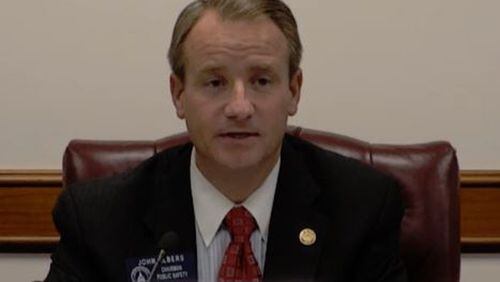The state senate's school-safety panel recommends adding hundreds of mental health professionals, and expanding school districts' taxing power to pay for them.
In its final meeting Tuesday, the Georgia Senate School Safety Study Committee unanimously voted on a plan to present to the State Legislature in January. The proposal’s biggest emphasis is crisis prevention.
“Our recommendation is to add a specialized mental health counselor – at least one in every school – and sometimes more than one,” said Sen. John Albers, R-Roswell, head of the committee. “Our counselors today are typically more administrative, helping folks out with career counseling — not trained in mental health.”
The goal is to place a strong priority on the mental health of students, especially those who show signs of instability or potential danger to themselves or their peers. In five public meetings, consultations with school safety experts and feedback from the public, the committee was repeatedly told that school counselors are often relied on to provide career and class counseling as well as mental health counseling, according to the committee report.
But adding more than 2,000 highly skilled professionals comes with a price tag. The committee recommended exploring legislation that would allow using ESPLOST (Education Special-Purpose Local-Option Sales Tax) funds to hire specifically trained mental health professionals to treat and serve students.
The sales tax for education was established in 1996. ESPLOST money now can only be used for capital improvement projects or paying off debt. Most school districts renew the tax every five years.
A state watchdog group would like any change in ESPLOST rules to be decided by voters.
“While committee recommendations are important, they should only be considered as such. Local school boards, school administrators, and taxpayers should be the ultimate deciders of how and where that tax money is spent,” said Sara Henderson, executive director of Common Cause Georgia.
Committee member Fran Millar, R-Atlanta, suggested building partnerships with businesses and the faith-based community to help offset costs.
“Fulton County’s been doing this for a while with the faith-based community,” he said. “Now we’re starting a pilot in DeKalb County. We’ve got megachurches throughout the metro area and these churches have a lot of resources and we shouldn’t just depend on government to fund this stuff.”
Albers agreed that getting outside parties involved is important. “Even with state funding, it probably won’t’ be enough,” he said. “Government can’t do it all and I don’t think we can provide enough money to do it all.”
Sen. Kay Kirkpatrick, R-Marietta, added that if ESPLOST fund restrictions are relaxed, the money could also be used for additional school police officers.
The committee’s recommendation also covers the physical security of buildings, facilities and buses. In the plan, each school system would identify security measures such as single, secure points of entry into each building; adequate speed bumps and concrete barriers in parking lots; locks on all windows and doors; more emergency exits; training for bus drivers to recognize and respond to threats; and changing fire drill procedures to ensure that attackers can’t use drills to lure students, staff and teachers into dangerous areas.
The third area the senate proposal focuses on is emergency response. The plan calls for local law enforcement agencies and emergency services departments to create and maintain emergency response plans, and for the entire state to be equipped with one unified radio communications network.
“We hope and pray that we will never get to this point, but it never hurts to be over-prepared,” said Albers. “We need to have updated emergency response plans done. Many of our local fire and police have some of that done, but we need to have that in place today. But most of that needs to be continually updated and working with the local school systems. We also need to make sure that we can communicate well.”
The committee was established shortly after the Valentine's Day shooting at Douglas High School in Parkland, Fla. Albers vowed to make sure its work wasn't in vain: "Recommendations are good and the work is solid. But the next most important step is what we do through legislation, what we do budgetarily and what we do through rules and regulations to make sure this is implemented."
About the Author







